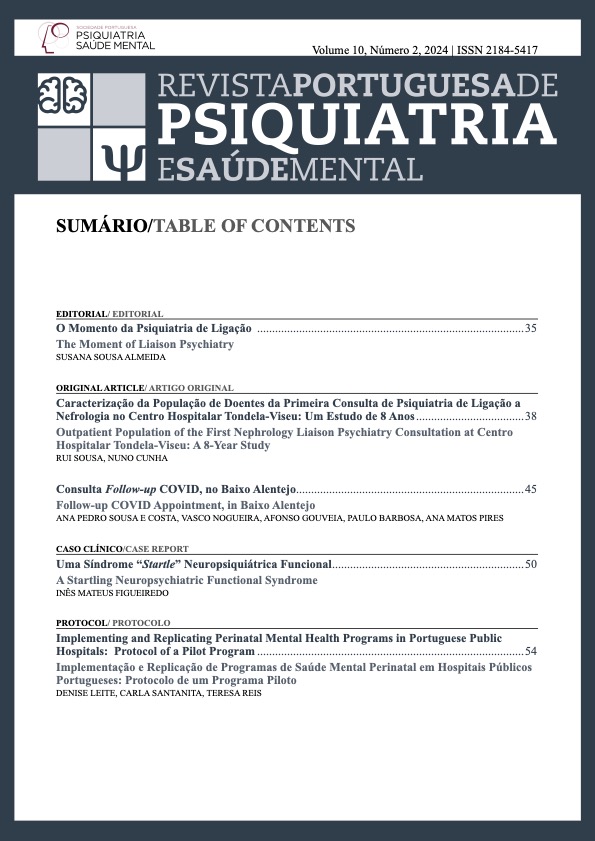Follow -up COVID Appointment, in Baixo Alentejo
DOI:
https://doi.org/10.51338/rppsm.473Keywords:
Cognitive Dysfunction, COVID-19/complications, Mental Health, Neuropsychological TestsAbstract
Introduction: There are several reasons why the pandemic can have consequences on mental health. The creation of a follow-up appointment for COVID patients aimed to assess their clinical status and assess therapy needs.Methods: Patients over 18 years old with COVID-19 from the ULSBA area were referred to this appointment. Psychiatric sequelae were assessed using the Brief Symptom Inventory and the Clinical Global Impression. The Montreal Cognitive Assessment was also applied to patients who presented conditions suggestive of cognitive decline.
Results: Four outcomes were identified: patients with no previous history of mental illness, who did not develop neuropsychiatric sequelae, so they were discharged; patients with previously identified mental illness who do not present changes, maintaining their usual appointment; patients with a history of mental illness in an acute crisis or without recent follow-up due to the pandemic, who were referred to their usual outpatient psychiatric appointment; and patients with no previous history of mental illness who, in the standardized assessment, present psychopathology, for which reason they began psychiatric follow-up.
Conclusion: This appointment made it possible to monitor 98 patients, with satisfactory results in the early identification of neuropsychiatric sequelae. Whenever necessary, follow‑up was carried out in a specialist consultation.
Downloads
References
Brooks SK, Webster RK, Smith LE, Woodland L, Wessely S, Greenberg N, et al. The psychological impact of quarantine and how to reduce it: rapid review of the evidence. Lancet. 2020;395:912-20. doi: 10.1016/S0140-6736(20)30460-8.
Holmes EA, O’Connor RC, Perry VH, Tracey I, Wessely S, Arseneault L, et al. Multidisciplinary research priorities for the COVID-19 pandemic: a call for action for mental health science. Lancet Psychiatry. 2020;7:547-60. doi: 10.1016/S2215-0366(20)30168-1.
Rossi R, Socci V, Talevi D, Mensi S, Niolu C, Pacitti F, et al. COVID-19 Pandemic and Lockdown Measures Impact on Mental Health Among the General Population in Italy. Front Psychiatry. 2020;11:790. doi: 10.3389/fpsyt.2020.00790.
Arciniegas DB, Anderson CA. Viral encephalitis: neuropsychiatric and neurobehavioral aspects. Curr Psychiatry Rep. 2004;6:372-9. doi: 10.1007/s11920-004-0024-x.
Harvey MA, Davidson JE. Postintensive Care Syndrome: Right Care, Right Now…and Later. Crit Care Med. 2016;44:381-5. doi: 10.1097/CCM.0000000000001531.
Nalbandian A, Sehgal K, Gupta A, Madhavan MV, McGroder C, Stevens JS, et al. Post-acute COVID-19 syndrome. Nat Med. 2021;27:601-15. doi: 10.1038/s41591-021-01283-z.
Drobnjak S. Brief Symptom Inventory. In: Gellman MD, Turner JR, editors. Encyclopedia of Behavioral Medicine. Springer: New York; 2013.
Freitas S, Simões MR, Alves L, Santana I. Montreal Cognitive Assessment (MoCA): normative study for the Portuguese population. J Clin Exp Neuropsychol. 2011;33:989-96. doi: 10.1080/13803395.2011.589374.








